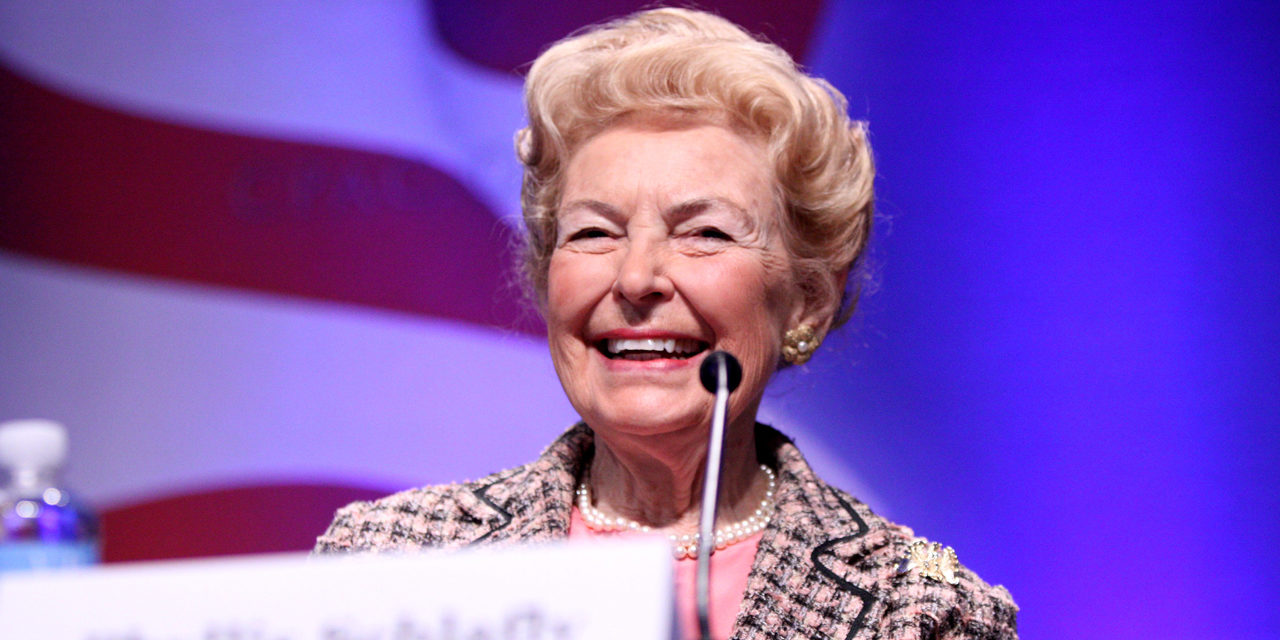Phyllis Schlafly is the subject of a major new series streaming on FX/Hulu entitled Mrs. America. Its executive producer is Cate Blanchett and she plays the lead role as Mrs. Schlafly. This series’ creation and showing is important, given Schlafly’s significance to contemporary American political culture.
Schlafly became one of the first political powerhouses for pro-family causes in America. But she didn’t start out as a firebrand who changed our nation in many positive ways. She was a humble, unassuming work-a-day mother and wife, minding her own business running a household and all the other things mothers and wives do. Her concern, as a woman, was how the burgeoning radical feminist movement was reshaping what it meant to be a woman.
Her fear was not that feminists were encouraging women to develop lives larger than their roles as mothers and wives. This has been a lazy and incorrect characterization many tried to portray, totally missing the irony that the revolution Schlafly was building was outside the home, out there in the public square. She was a woman speaking truth to power, making history, all the things her feminist opponents were encouraging women to do. If she had been speaking out, organizing and educating women on liberal causes with the success and influence she mobilized conservative women, she would have been a feminist deity. Have you seen that feminist bumper sticker “Well-behaved women seldom make history”? Well not only was Schlafly not “well-behaved,” she was even more radical than her feminist sisters. She set out and went precisely against the cultural tide of the day. As such, she was braver, bolder and stronger than the women she was challenging.
What set the spark to this suburban mid-west mother was the introduction of the so-called Equal Rights Amendment (ERA) in Congress in the early 1970s. Schlafly discerned this effort was not so much about equality of the sexes, which she of course supported. It was about enshrining into the United States Constitution the idea that differences between men and woman do not exist. Thus, the ERA would make it unconstitutional to allow distinctions between men and women in law and policy. Rather than helping women, this would harm women in significant ways. One very serious consequence would have been what we are seeing today with the opening of women’s bathrooms and sports teams to men. It would have required women fight on the frontlines of military combat. It would also mean the loss of women’s economic protections in divorce proceedings as well as mothers’ unique standing in child custody battles. These were but a few of her concerns.
Schlafly’s weapon against the ERA was founding Eagle Forum, an unlikely army of wives and mothers from fly-over country that exists to this day. She rallied these women in every state of the Union, teaching them how to advocate for their beliefs at their own Statehouses as well as in the nation’s capital. She exhibited a wry sense of humor in her work, often beginning her public talks by quipping “I’d like to thank my husband for letting me be here tonight” explaining “I always like to say that, because it makes the libs so mad.”
A UC Berkeley-educated professor of history at Arizona State University wrote one of the definitive biographies on Schlafly: Phyllis Schlafly and Grassroots Conservatism: A Woman’s Crusade It is published by Princeton University Press. The author, Donald T. Critchlow, pulls no punches saying what he things of the mini-series’ historical portrayal of Schlafly. In a word, he calls it “deplorable.” Critchlow was actually not surprised though, explaining how elites on the left “can’t understand … that [profamily conservatives] can have warm personalities and they aren’t filled with hatred and racism and anti-Semitism and everything else, every other kind of bigotry.” He adds, “They just have a hard time understanding people like Phyllis Schlafly, a woman who was devoted to her country and to the conservative cause and to founding principles, and devoted to her family.”
Critchlow explained the problems with the portrayal are of two categories. “First of all,” he explained, “the mischaracterization of Phyllis Schlafly’s family life and marital relations.” He adds, “The second problem is that it really doesn’t capture at all why Phyllis Schlafly was a hero to many conservative women, nor does it try to explain conservative women reacting against ERA.” You can read Critchlow’s fuller comments here.
Anne Schlafly Cori, Schlafly’s youngest daughter, established a website, mrsamerica.org, to correct the many misunderstandings and outright falsehoods about her mother in the series. In an interview, Cori expressed her most personal problem with the series and Cate Blanchet’s portrayal of her mother.
“She has the hair, and the makeup, and the costuming correct. What she misses is the warmth in my mother’s eyes. She plays her as a cold, calculating, power-hungry woman.”
She continues,
“My mother led a volunteer group of women, and I don’t think she could lead volunteer women unless she was warm and inspiring. And she was. She was encouraging, she got women to do things, and you can’t do it if you bark and order them around. You do it by building up leadership. … And she made it her mission to make a multitude of leaders.”
It really is no small thing that Hollywood elites would recognize the importance and influence of Phyllis Schlafly, much less bother to make a major television series on her even if they get much of her story wrong. Hopefully, it will encourage many to dig deeper and get to know the real woman and the remarkable impact she had for good.
Photo by Gage Skidmore






